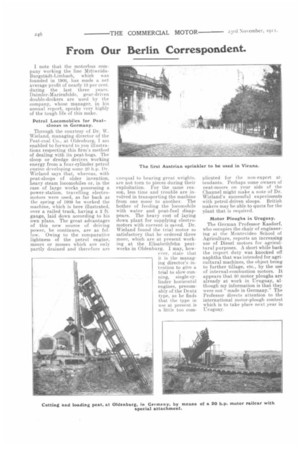From Our Berlin Correspondent ,
Page 4

Page 5

If you've noticed an error in this article please click here to report it so we can fix it.
I note that the motorbus company working the line MittweidaBurgstadt-Limbach, which was founded in 1900, has made a net average profit of nearly 13 per cent. during the last three years. Daimler-Marienfelde, gear-driven double-deckers are used by the company, whose manager, in his annual report, speaks very highly of the tough life of this make.
Petrol Locomobiles for Peatsloops in Germany.
Through the courtesy of Dr. W. Wieland, managing director of the Peat-coal Co., at Oldenburg, I am enabled to forward to you illustrations respecting this firm's method of dealing with its peat-bogs. The sloop or dredge derives working energy from a four-cylinder petrol engine developing some 20 hp.
Wieland says that, whereas, with peat-sloops of older invention, heavy steam locomobiles or, in the case of large works possessing a power-station, travelling electromotors were used, as far back as the spring of 1909 he worked the machine, which is here illustrated, over a railed track, having a 2 ft. gauge, laid down according to his own plans. The great advantages of this new source of driving power, he continues, are as follow. Owing to the comparative lightness of the petrol engine, moors or mosses which are only partly drained and therefore are unequal to bearing great weights, are not torn to pieces during their exploitation. For the same reason, less time and trouble are involved in transporting the machine from one moor to another. The bother of feeding the locomobile with water and peat-fuel disappears. The heavy cost of laying down plant for supplying electromotors with current is saved. Dr. Wieland found the trial motor so satisfactory that he ordered three more, which are at present working at the Elisabethfehn peatworks in Oldenburg. I may, however, state that it is the manag
ing director's intention to give a trial to slow-running, single-cylinder horizontal engines, presumably of the Deutz type, as he finds that the type in use at present is a little too com plicated for the non-expert attendants. Perhaps some owners of neat-moors on your side of the Channel might make a note of Dr. Wieland's successful experiments with petrol-driven sloops. British makers may be able to quote for the plant that is required.
Motor Ploughs in Uruguay.
The German Professor Kasdorf, who occupies the chair of engineering at the Montevideo School of Agriculture, reports an increasing use of Diesel motors for agricultural purposes. A short while back the import duty was knocked off naphtha that was intended for agricultural machines, the object being to further tillage, etc., by the use of internal-combustion motors. It appears that 50 motor ploughs are already at work in Uruguay, although my information is that they were not "made in Germany." The Professor directs attention to the international motor-plough contest which is to take place next year in Uruguay. Germany's Foreign Trade During the First Three Quarters.
During the first nine months of the current year Germany imported 106 freight automobiles, as compared with 54 in the like period of 1910. The respective values are given at 203,450 and £32,300. Switzerland and France sent more vehicles over the frontier, the former country increasing her share from 84,200 to 148,600 kilos. As to exports, Germany's respective sales expanded from 166 to 245 vehicles. Gt. Britain took fewer and so did Brazil ; whereas Italy, Austro-Hungary and European _Russia took more. But Russia's figure was not so high as German activity might have led one to expect, sales having risen from 102,200 kilos. to 167,600 kilos. only. The relative values for the two years of Germany's sales stand at :141,900 and &.:98,000.
The Austrian Subvention Trials.
It. transpires that, while the Austrian subvention wagons worked satisfactorily, the 10 participating trains" proved, on the whole, unequal to the demands made upon them, springs and wheels giving way under the weight. These failures were not due to the useful loads which were moderate enough-3 tons was carried on each lorry and 2 tons on each trailer—but rather to the vehicles' own weight. Makers found themselves unable to conform to the numerous regulations and yet to produce lighter vehicles. The many demands on the part of the W.O. greatly increased the cost of production without furthering the creation of a serviceable type. Motorcabs Acquired on the Instalment System in Berlin: More Restrict ions.
At the instance of the Association of German Automobile Makers, the Lierlin Commissioner of Police has placed restrictions upon the working of motorcabs acquired on the instalment system and not fully paid for. The makers asked that all such cabs should be barred from traffic, which seems to me to overshoot the mark. Von Jagow evidently thought so as well, for he has decided that if a motor firm should make a formal application for an injunction, he will grant it, provided the selling price of the cab, including licences, amounts to at least 5,500 marks (R275). Also, should the buyer possess a number, it can be barred only with the buyer's consent, on condition that at least 1,000 marks (250) shall have been paid towards the purchase of the cab.




















